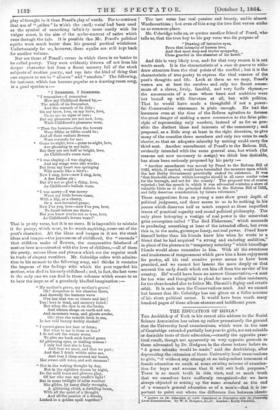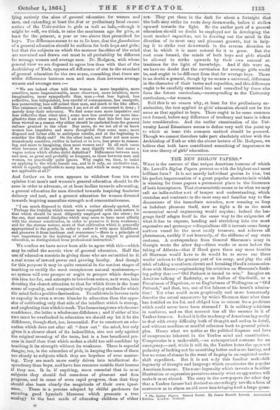THE EDUCATION OF GIRLS.*
THE Archbishop of York in his recent able address to the Social Science Association has taken up rather prematurely the ground that the University local examinations, which wore in the case of Cambridge extended partially last year to girls, are not suitable or desirable tests of their education,—exactly the opposite prac- tical result, though not apparently on very opposite grounds to those advocated by Dr. Hodgson in the clever lecture before us. "A great mistake would be made," said the Archbishop, after deprecating the extension of these University local examinations to girls, "if without any attempt at an independent treatment of female education we catch at some existing scheme of examina- tion for boys and assume that it will suit both purposes." There is so much truth in this view, and so much truth that we ourselves have uniformly recognized—for we have always objected to setting up the same standard as the end of a woman's general education as of a man's—that it is im- portant to point out where the difference lies between identi- • Lecture on the Education of Girls Considered in Connection with the University Local Examinations. By W. B. Hodgson, LL.D. London: Emily Faithfull.
fying entirely the aims of general education for women and
men, and extending at least the first or preliminary local exami- nation of the Universities to girls as well as lads,—though it might be well, we think, to raise the maximum age for girls, at least for the present, a year or two above that prescribed for boys. The difference seems to us to lie here, that the foundations of a general education should be uniform for both boys and girls ; but that the subjects on which the maturer faculties of the mind
are exercised and drawn out must in all probability be different for average women and average men. Dr. Hodgson, with whose general view we are disposed to agree less than with that of the Archbishop of York, opposes all difference of aim in the standard of general education for the two sexes, remarking that there are wider differences between men and men than between average women and average men :—
" We are indeed often told that woman is more impulsive, more sensitive, more impressionable, more observant, more intuitive, more imaginative, more sympathetic than man ;—but less logical, less reflective, less independent, less careful of consequences, less energetic, less persevering, less self-poised than man, and much to the like effect. The existence of such differences I am not at all concerned to deny ; I merely deny their relevancy. We find some men more impulsive and less reflective than other men ; some men less cautious or more ima- ginative than other men ; but I am not aware that this fact has ever been viewed as a reason why either should be excluded from the general culture granted to the other Nay more, do we not all of us know women less impulsive and more thoughtful than some men ; more disposed and better able to anticipate results, and at the beginning to consider the likely end? On the other hand, are there not men more tremulously sensitive, swifter in hatred or in love, less prone to reason- ing, and more to imagining, than most women are ? In all such cases what becomes of the principle, if we may dignify with that name a vague notion which eludes strict definition ? Differences between men and men, as great and probably as frequent, as those between men and women, we practically quite ignore. Why ought we, then, to insist on applying to the whole female sex, and to it only, an exclusive test, which is equally applicable to many men, and which to many women is not applicable at all ?"
And further on he even appears to withdraw from his own opinion that men's and women's general education should be the same in order to advocate, or at least incline towards advocating, a general education for men directed towards inspiring feminine
delicacy and tact, and a general education for women directed towards inspiring masculine strength and concentxativeness.
"I am much disposed to think with a writer already quoted, that Perhaps the training which seems most congenial with each nature is that which should be most diligently employed upon the other ; for the one, that mental discipline which may seem to have most affinity with the sterner constitution, in order to preserve it from weakness ; and for the sterner nature, more of that cultivation which is generally appropriated to the gentle, in order to endow it with more kindliness and preserve it from hardness and coarseness.'—Here is a principle of vast importance in the training of either sex, in regard to general education, as distinguished from professional instruction."
We confess we have never been able to agree with this—which may be called the ascetic view of general education. Half the use of education consists in giving those who are submitted to it a real sense of inward power and growing faculty. And though for this purpose it may be quite essential in the earliest stages of teaching to rectify the most conspicuous natural weaknesses,— no system will ever prosper or ought to prosper which develops this idea too far, and attempts to browbeat nature, as it were, into devoting the closest attention to that for which there is the least sense of capacity, and comparatively neglecting studies for which the mind feels a positive fascination. To cultivate in inverse ratio
to capacity is even a worse blunder in education than the oppo- site of cultivating only that side of the intellect which is strong, and neglecting that which is weak. The formerinspires a wholesome confidence, the latter a wholesome diffidence ; and if either of the two must be overlooked in education we should say let it be the diffidence, thoughettat, too, isessential. For to construct an edu- cation which does not after all "draw out" the mind, but only gives it a clearer chart of its imbecilities, sins not only against
the original meaning of the term, but is a less beneficent pro- cess in itself than that which makes a child too self-confident by
teaching it its strength without its weakness. There is especial .danger, too, in the education of girls, in keeping the mass of them
too closely to subjects which they are hopeless of ever master- ing. They are much more easily driven into intellectual de- spondency than boys, and have less resource outside their lessons if they are. It is, if anything, more essential that in most subjects they should feel conscious of pleasant and firm progress, and in some of even rapid progress, than that they should also learn clearly the magnitude of their own ignor- ance. There is a process adopted by skilful gardeners for securing good hyacinth blossoms which presents a true analogy to the best mode of educating children of either sex. They put them in the dark for about a fortnight that the bulb may strike its roots deep downwards, before it strikes upward towards the light. So the earlier part of a general education should no doubt be employed not in developing the most marked capacities, not in drawing out the mind in the direction of its most easy and pleasant growth, but in help- ing it to strike root downwards in the reverse direction to
that in. which it is most natural for it to grow. But the root once formed, the minds of both boys and girls should be allowed to strike upwards by their own natural at- tractions. for the light of knowledge. And if this were so, we have no doubt that the curriculum for average girls would be, and ought to be different from that for average boys. There is no doubt a general, though by no means a universal, difference in the character of their tastes and capacities, and this difference ought to be carefully examined into and consulted by those who form the future curriculum,—corresponding to the University curriculum,—for women.
Still this is no reason why, at least for the preliminary ex- amination, the test applied to girls' education should not be the same as that applied to boys. There ought to be some common root formed, before any difference of tendency and taste is taken into consideration. And the earlier examination of the Uni- versity Local Examiners seems to define very well the point up to which at least this common method should be pursued. Though we cannot therefore take part absolutely either with the Archbishop of York or with the clever lecture of Dr. Hodgson, we believe that both have contributed something of importance to the true theory of girls' education.































 Previous page
Previous page